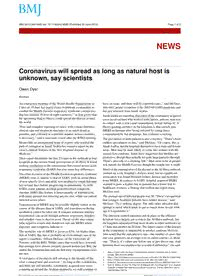
2013 Coronavirus will spread as long as natural host is unknown, say scientists PDF
Preview 2013 Coronavirus will spread as long as natural host is unknown, say scientists
Coronavirus will spread as long as natural host is unknown, say scientists Owen Dyer Montreal An emergency meeting of the World Health Organization in Cairo on 19 June has urged closer worldwide cooperation to combat the Middle Eastern respiratory syndrome coronavirus that has claimed 39 lives in eight countries,1-4 as fear grows that the upcoming Hajj to Mecca could spread the disease around the world. “Fast and complete reporting of cases, with contact histories, clinical care and treatment outcomes in as much detail as possible, and collected in a uniform manner across countries, is necessary,” said a statement issued after the WHO meeting. Meanwhile an international team of experts who tracked the path of contagion in Saudi Arabia has issued a report on the virus’s clinical features in the New England Journal of Medicine.5 Their report documents the first 23 cases in the outbreak in four hospitals in the eastern Saudi governorate of Al-Hasa. It noted striking similarities to the coronavirus that caused severe acute respiratory syndrome (SARS) but also some key differences. The clinical course of the Middle Eastern respiratory syndrome (MERS) virus is similar to that of SARS, with an initial phase of non-specific fever and mild, non-productive cough that may last several days before progressing to pneumonia. As with SARS, some patients develop gastrointestinal symptoms. Another SARS-like feature is heterogeneity of transmission, with many patients not infecting anyone else, while one patient infected seven others. Transmission of MERS may be possible slightly earlier in the course of the disease than in SARS, and transmission during incubation cannot be ruled out. It remains unknown whether transmission can occur through airborne respiratory droplets and whether virus is shed in stool. Throat swabs may return false negative results and should not rule out MERS when exposure and symptoms indicate it. The mortality rate of MERS is given as 65%, far higher than that of SARS. But this is probably an overestimate, one of the report’s coauthors, Allison McGeer, of the University of Toronto, told the BMJ. Milder cases that would have lowered that average have almost certainly passed undetected. But, she added, the Jordanian data indicate that truly asymptomatic cases are rare. A vital piece of the puzzle still missing is the identity of the virus’s natural host and reservoir. “As long as this is unknown, and there are still sporadic, community acquired new cases cropping up around the Arabian peninsula, we will continue to have an issue, and there will be exported cases,” said McGeer, who led Canada’s response to the 2003-04 SARS pandemic and has just returned from Saudi Arabia. Saudi media are reporting that some of the community acquired cases involved men who worked with camels, and one man was in contact with a sick camel immediately before falling ill. A theory gaining currency in the kingdom is that camels pass MERS to humans after being infected by eating dates contaminated by bat droppings, but evidence is lacking. The prevalence of male patients is also a mystery. “There’s been endless speculation on this,” said McGeer. “Of course, this is Saudi Arabia, and the hospitals themselves have male and female areas. Men may be more likely to come into contact with the natural host outdoors. Some have suggested that burkhas are protective, though they actually let quite large particles through. There’s also talk of a smoking link.” Men seem to be at greater risk outside the Middle East too, though the sample size is small. Much of the transmission of the disease in the Al-Hasa outbreak centred on a city hospital’s dialysis ward, but no significant association was found between kidney disease and mortality from MERS. In contrast to SARS, hospital acquired MERS seemed to pose a higher risk to patients but a lower risk to healthcare workers, a finding that baffled the expert team, McGeer said. The average age of infected people was 56. “There’s no question that younger, healthier patients have milder disease,” said McGeer. “To a striking degree. The only other infection that springs to mind which tends to get so much more severe with age is Legionnaire’s.” The infection control measures put in place in the affected hospitals have largely put a stop to the Al-Hasa outbreak, but the kingdom announced four more deaths in other outbreaks on 17 June and another on 20 June. The future course of the disease in the community is impossible to predict, cautions McGeer, who noted that the reproductive rate—the number of cases that one case generates on average over its entire course—is about one. “That is, it’s either just below one or just above one. And between those two numbers lies a world of difference,” she said. 1 Wise J. Patient with new strain of coronavirus is treated in intensive care at London hospital. BMJ 2012;345:e6455. 2 Wise J. Two more cases of novel coronavirus are confirmed in UK. BMJ 2013;346:f1030. 3 Wise J. Patient dies from novel coronavirus in UK. BMJ 2013;346:f1133. 4 Gulland A. Two cases of novel coronavirus are confirmed in France. BMJ 2013;346:f3114. 5 Assiri A, McGeer A, Perl TM, Price CS, Al Rabeeah AA, Cummings DAT, et al. Hospital outbreak of Middle East respiratory syndrome coronavirus. N Engl J Med 2013, doi:10. 1056/NEJMoa1306742. For personal use only: See rights and reprints http://www.bmj.com/permissions Subscribe: http://www.bmj.com/subscribe BMJ 2013;346:f4083 doi: 10.1136/bmj.f4083 (Published 25 June 2013) Page 1 of 2 News NEWS Cite this as: BMJ 2013;346:f4083 © BMJ Publishing Group Ltd 2013 For personal use only: See rights and reprints http://www.bmj.com/permissions Subscribe: http://www.bmj.com/subscribe BMJ 2013;346:f4083 doi: 10.1136/bmj.f4083 (Published 25 June 2013) Page 2 of 2 NEWS
